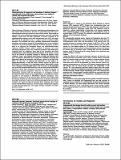Por favor, use este identificador para citar o enlazar a este item:
http://hdl.handle.net/10261/305326COMPARTIR / EXPORTAR:
 SHARE
BASE SHARE
BASE
|
|
| Visualizar otros formatos: MARC | Dublin Core | RDF | ORE | MODS | METS | DIDL | DATACITE | |

| Título: | Monocarboxylate 8 transporter and deiodinase 2 deficiency impairs neurogliogesis in the adult mouse subventricular zone leading to cellular and functional alterations |
Autor: | Valcárcel-Hernández, Víctor CSIC; Vancamp, Pieter; Remaud, Sylvie; Guadaño-Ferraz, Ana CSIC ORCID | Fecha de publicación: | 10-sep-2022 | Citación: | 44th Annual Meeting of the European Thyroid Association (2022) | Resumen: | Thyroid hormones (THs) play a crucial role orchestrating neurodevelopment, but also regulate adult brain function. Recently, the potent effects that THs exert in adult neurogenic niches have started to be uncovered in rodents. These include an important role in the modulation of progenitor generation, especially controlling whether a neural stem cell (NSC) determines to become a neuronal or an oligodendroglial progenitor in the adult subventricular zone (SVZ), the largest NSC niche in the mammalian brain. A complex network of regulators tightly modulates TH availability and action, including transmembrane transporters, deiodinases and receptors. Among the TH-transporters, there is only one that is TH-specific, the monocarboxylate transporter 8 (MCT8). Deficiency of MCT8 leads to an ultra-rare but devastating disease, the Allan-Herndon-Dudley Syndrome (AHDS). Patients exhibit a plethora of endocrine and severe neurological disturbances and so far, no effective treatment for their neurological symptoms exists. Its complexity, along with its low prevalence and severe symptomatology, makes animal models and biomarkers of the disease a crucial step in the research for potential strategies to alleviate the patients’ severe conditions. Using a well-validated animal model of AHDS, the Mct8/Dio2 KO mice, we aimed to characterize how a reduced T3 availability structurally and functionally affected the neurogenic and gliogenic capacity of the adult SVZ-NSCs. To this end, we analysed the expression of cell markers by immunohistochemistry to study the balance between neurons and glia in the SVZ, both in-vivo and using ex-vivo neurosphere cultures. These studies revealed severe alterations in the neuroglial balance, with an increase of the neuron/glia ratio in the SVZ in adult Mct8/Dio2 KO mice. We also observed that MCT8/DIO2 deficiency reduced NSC proliferation two-fold and hampered migrating of proliferating neuronal progenitors. Moreover, we tested the effects of administering exogenous THs and TH-analogues on neurospheres prepared from dissected SVZs. Neither the neuron/glia balance, nor proliferative activity responded to TH treatment in MCT8/DIO2 deficient neurospheres. Also, behaviour consequences of the observed NSCs alterations were studied using the olfactory memory and odour discrimination tests, as potential non-invasive biomarkers of the disease. These tests revealed that Mct8/Dio2 KO mice did not recognize new odours and failed to memorize them. Altogether, these results indicate that MCT8/DIO2 deficiency severely hampers TH-dependent regulation of adult SVZ-neurogliogenesis and suggest potential biomarkers for future preclinical studies. | Descripción: | Resumen del trabajo presentado en 44th Annual Meeting of the European Thyroid Association, celebrado en Bruselas (Bélgica) del 10 al 13 de septiembre de 2022. | Versión del editor: | http://dx.doi.org/10.1530/endoabs.84.OP-11-57 | URI: | http://hdl.handle.net/10261/305326 | DOI: | 10.1530/endoabs.84.OP-11-57 | Identificadores: | doi: 10.1530/endoabs.84.OP-11-57 |
| Aparece en las colecciones: | (IIBM) Comunicaciones congresos |
Ficheros en este ítem:
| Fichero | Descripción | Tamaño | Formato | |
|---|---|---|---|---|
| Monocarboxylate_Valcárcel_ComCong2022.pdf | 37,53 kB | Adobe PDF |  Visualizar/Abrir |
CORE Recommender
Page view(s)
30
checked on 22-may-2024
Download(s)
30
checked on 22-may-2024
Google ScholarTM
Check
Altmetric
Altmetric
NOTA: Los ítems de Digital.CSIC están protegidos por copyright, con todos los derechos reservados, a menos que se indique lo contrario.
